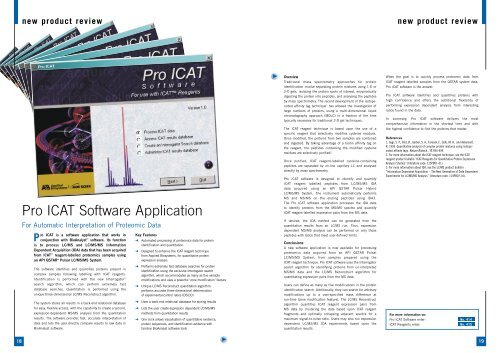Issue 4 Summer 2002 - Applied Biosystems
Issue 4 Summer 2002 - Applied Biosystems
Issue 4 Summer 2002 - Applied Biosystems
Create successful ePaper yourself
Turn your PDF publications into a flip-book with our unique Google optimized e-Paper software.
18<br />
new product review<br />
Pro ICAT Software Application<br />
For Automatic Interpretation of Proteomic Data<br />
P<br />
ro ICAT is a software application that works in<br />
conjunction with BioAnalyst software. Its function<br />
is to process LC/MS and LC/MS/MS Information<br />
Dependent Acquisition (IDA) data that has been acquired<br />
from ICAT reagent-labelled proteomics samples using<br />
an API QSTAR ® Pulsar LC/MS/MS System.<br />
The software identifies and quantifies proteins present in<br />
complex samples following labelling with ICAT reagents.<br />
Identification is performed with the new Interrogator search algorithm, which can perform extremely fast<br />
database searches. Quantitation is performed using the<br />
unique three-dimensional LC/MS Reconstruct algorithm.<br />
The system stores all results in a back-end relational database<br />
for easy, flexible access, with the capability to create a second,<br />
expression-dependent MS/MS analysis from the quantitation<br />
results. The software provides fast, accurate interpretation of<br />
data and lets the user directly compare results to raw data in<br />
BioAnalyst software.<br />
Key Features<br />
➜ Automated processing of proteomics data for protein<br />
identification and quantitation<br />
➜ Designed to enhance the ICAT reagent technique<br />
from <strong>Applied</strong> <strong>Biosystems</strong>, for quantitative protein<br />
expression analysis<br />
➜ Performs extremely fast database searches for protein<br />
identification using the exclusive Interrogator search<br />
algorithm, which accommodates as many as five variable<br />
modifications and uses a powerful ‘zone modification’ feature<br />
➜ Unique LC/MS Reconstruct quantitation algorithm<br />
performs accurate three-dimensional determination<br />
of experimental:control ratios (D8:D0)<br />
➜ Uses a back-end relational database for storing results<br />
➜ Lets the user create expression dependent LC/MS/MS<br />
methods from quantitation results<br />
➜ One click allows visualisation of quantitative evidence,<br />
protein sequences, and identification evidence with<br />
familiar BioAnalyst software tools<br />
Overview<br />
Traditional mass spectrometry approaches for protein<br />
identification involve separating protein mixtures using 1-D or<br />
2-D gels, isolating the protein spots of interest, enzymatically<br />
digesting the protein into peptides, and analysing the peptides<br />
by mass spectrometry. The recent development of the isotopecoded<br />
affinity tag technique 1 has allowed the investigation of<br />
large numbers of proteins, using a multi-dimensional liquid<br />
chromatography approach (MDLC) in a fraction of the time<br />
typically necessary for traditional 2-D gel techniques.<br />
The ICAT reagent technique is based upon the use of a<br />
specific reagent that selectively modifies cysteine residues.<br />
Once modified, the proteins from two samples are combined<br />
and digested. By taking advantage of a biotin affinity tag on<br />
the reagent, the peptides containing the modified cysteine<br />
residues are selectively purified 2 .<br />
Once purified, ICAT reagent-labelled cysteine-containing<br />
peptides are separated by on-line capillary LC and analysed<br />
directly by mass spectrometry.<br />
Pro ICAT software is designed to identify and quantify<br />
ICAT reagent labelled peptides from LC/MS/MS IDA<br />
data acquired using an API QSTAR Pulsar Hybrid<br />
LC/MS/MS System. The instrument automatically performs<br />
MS and MS/MS on the eluting peptides using IDA3.<br />
The Pro ICAT software application processes the IDA data<br />
to identify proteins from the MS/MS spectra and quantify<br />
ICAT reagent-labelled expression pairs from the MS data.<br />
If desired, the IDA method can be generated from the<br />
quantitation results from an LC/MS run. Thus, expression<br />
dependent MS/MS analysis can be performed on only those<br />
peptides with ratios that meet user-defined limits.<br />
Conclusions<br />
A new software application is now available for processing<br />
proteomics data acquired from an API QSTAR Pulsar<br />
LC/MS/MS System, from samples prepared using the<br />
ICAT reagent technique. Pro ICAT software uses the Interrogator<br />
search algorithm for identifying proteins from un-interpreted<br />
MS/MS data and the LC/MS Reconstruct algorithm for<br />
quantitating expression pairs from the MS data.<br />
Users can define as many as five modifications in the protein<br />
identification search. Additionally, they can search for arbitrary<br />
modifications up to a user-specified mass difference at<br />
run-time (zone modification feature). The LC/MS Reconstruct<br />
algorithm quantifies ICAT reagent expression pairs from<br />
MS data by clustering the data based upon ICAT reagent<br />
fragments and optimally collapsing adjacent spectra for a<br />
maximum signal-to-noise ratio. Users may also run expression<br />
dependent LC/MS/MS IDA experiments based upon the<br />
quantitation results.<br />
new product review<br />
When the goal is to quickly process proteomic data from<br />
ICAT reagent labelled samples from the QSTAR system data,<br />
Pro ICAT software is the answer.<br />
Pro ICAT software identifies and quantifies proteins with<br />
high confidence and offers the additional flexibility of<br />
performing expression dependent analysis from interesting<br />
ratios found in the data.<br />
In summary, Pro ICAT software delivers the most<br />
comprehensive information in the shortest time and with<br />
the highest confidence to find the proteins that matter.<br />
References<br />
1. Gygi, S. P., Rist, B., Gerber, S. A., Turecek, F., Gelb, M. H., and Aebersold,<br />
R. 1999. Quantitative analysis of complex protein mixtures using isotopecoded<br />
affinity tags. Nature Biotech., 17:994-999.<br />
2. For more information about the ICAT reagent technique, see the ICAT<br />
reagent product bulletin “ICAT Reagents for Quantitative Protein Expression<br />
Analysis Studies” (literature code: 125PB01-01).<br />
3. For more information about IDA, see the LC/MS product bulletin<br />
“Information Dependent Acquisition – The Next Generation of Data Dependent<br />
Experiments for LC/MS/MS Analysis” (literature code: 114PB07-01).<br />
For more information on:<br />
Pro ICAT Software enter:<br />
No. 414<br />
ICAT Reagents enter: No. 415<br />
19


